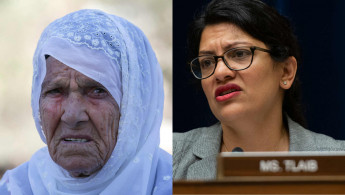Congresswoman Rashida Tlaib brands decision to ban her from visiting Palestinian grandmother 'sign of weakness'
US lawmaker Rashida Tlaib has called Israel's decision on Thursday to block her from visiting her Palestinian grandmother a "sign of weakness".
The Palestinian-American congresswoman was to lead a congressional delegation to the occupied West Bank alongside fellow Democrat Congresswoman Ilhan Omar, but the pair were abrubtly banned by Israel just a day ahead of their scheduled arrival.
"This woman right here is my sity [grandmother]," Tlaib said on Twitter alongside a photograph of her grandmother, who lives near the West Bank city of Ramallah.
"The decision by Israel to bar her granddaughter, a U.S. Congresswoman, is a sign of weakness [because] the truth of what is happening to Palestinians is frightening."
The outspoken congresswoman added that her grandmother deserved to "live in peace and with human dignity".
"I was looking forward to it," Tlaib said in reply to Avner Gvaryahu, Executive Director of Breaking the Silence, an Israeli NGO staffed by former soldiers who lead tours of the southern West Bank.
Gvaryahu had said he would have "loved to take [Omar] and [Tlaib] on a tour of Hebron."
"There's no joy in seeing or showing the harsh reality of the territories, but change will only come when we face up to the truth," he said in a tweet.
Tlaib last year announced she would spearhead the delegation to the occupied West Bank, hoping to counterbalance an existing annual trip for Congress members organised by the prominent pro-Israel lobby AIPAC.
|
|
The visit would tackle "issues like Israel's detention of Palestinian children, education, access to clean water, and poverty", she said.
But the Palestinian-American lawmaker also hoped to stay two additional days to visit her grandmother Muftia Tlaib, a resident of the West Bank village of Beit Ur al-Fouqa.
Tlaib was born in the US state of Michigan to Palestinian immigrant parents, her mother hailing from Beit Ur al-Fouqa and her father from the East Jerusalem neighbourhood of Beit Hanina.
Alongside Omar, she has been a prominent advocate for Palestinian rights.
The two have also been outspoken in their support for the Boycott, Divestment and Sanctions (BDS) movement, a peaceful initiative to pressure Israel to cease settlement construction, stop its occupation of Palestinian land, and end human rights violations against Palestinians.
Omar, Tlaib and fellow "Squad" member Alexandria Ocasio-Cortez were among just 17 Congress members to vote against a non-binding resolution condemning BDS last month.
|
|
Israel bans entry to BDS supporters.
Although the Israeli ambassador to the United States had earlier signalled that the country would allow Omar and Tlaib to enter despite their support for economic, cultural and educational boycotts, the Israeli Interior Ministry on Thursday confirmed the pair would not be entering Israel or the West Bank.
The decision was pushed for by President Donald Trump, who accused the two Muslim-American congresswomen of anti-Semitism.
"It would show great weakness if Israel allowed Rep Omar and Rep Tlaib to visit," he said in a tweet earlier on Thursday. "They hate Israel & all Jewish people, & there is nothing that can be said or done to change their minds."
Omar slammed Trump as an "Islamophobe" in a statement on Thursday, condemning the decision to bar entry for her and Tlaib as "chilling".
"The irony of the 'only democracy' in the Middle East making such a decision is that it is both an insult to democratic values and a chilling response to a visit by government officials from an allied nation," she said.





 Follow the Middle East's top stories in English at The New Arab on Google News
Follow the Middle East's top stories in English at The New Arab on Google News
![The UAE is widely suspected of arming the RSF militia [Getty]](/sites/default/files/styles/image_330x185/public/2024-11/GettyImages-472529908.jpg?h=69f2b9d0&itok=Yauw3YTG)
![Netanyahu furiously denounced the ICC [Getty]](/sites/default/files/styles/image_330x185/public/2024-11/GettyImages-2169352575.jpg?h=199d8c1f&itok=-vRiruf5)
![Both Hamas and the Palestinian Authority welcomed the ICC arrest warrants [Getty]](/sites/default/files/styles/image_330x185/public/2024-11/GettyImages-2178351173.jpg?h=199d8c1f&itok=TV858iVg)